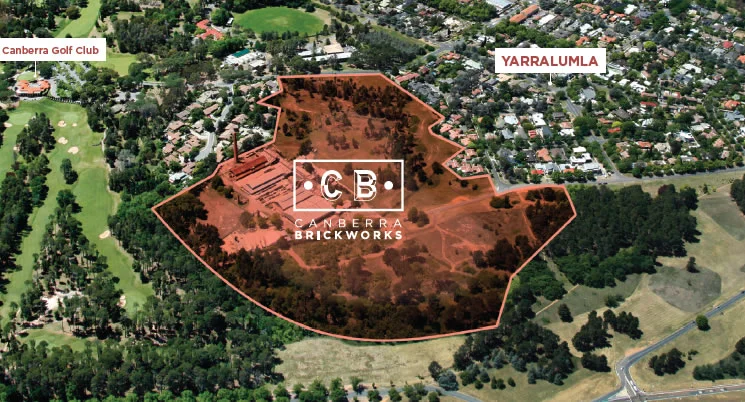IMAGE: The Canberra Brickworks Precinct in Yarralumla. Photo: Land Development Agency (LDA).
MORE INFORMATION
For more information on the Canberra Brickworks Precinct project head to www.lda.act.gov.au/canberrabrickworksTHE PROJECT:
MosaicLab was engaged by the Land Development Agency (LDA), to facilitate a Community Panel which would establish a set of ‘objectives’ to guide the future development of the Canberra Brickworks Precinct (CBP) - a historic heritage site in the suburb of Yarralumla. The final set of objectives would form part of the assessment of tenders for the development.
THE CHALLENGE
The CBP project had attracted controversy in the past and attempts to progress the project had failed on two occasions. These past processes had left community members left feeling dis-empowered, ignored and distrustful. The project needed to be approached in a new way that encouraged a strong sense of stakeholder ownership over the project.
Additionally, the objectives developed by the panel needed to balance the expectations and needs of stakeholders with support for the site's history and heritage while meeting urban renewal requirements. This challenging task required in-depth consideration of a range of inputs and information.
THE COMMUNITY PANEL
This was the first time that the ACT Government had engaged a 'citizen's panel'. The panel offered participants an advisory role with a high level of authority and influence and sessions consisted of six collaborative workshops run between November 2015 and March 2016.
The panel, which represented a broad range of local interest groups, was required to find high levels of agreement (80% or higher consensus) on their final recommendations.
““We went into the community panel process feeling sceptical. As a community organization we had experienced decades of frustration with government planning processes. When the ACT Government established the CBP Community Panel, we finally had a seat at the table – literally – and it felt like a sensible, iterative approach to community engagement. Once we had responsibility as member of the panel, we were able to go back to the community to update, consolidate and refine community opinion.”
”
SUCCESS FACTORS
For the panel to be able to rise to the challenge the LDA needed to:
- be willing to try something different,
- provide the panel with the right resources,
- be very open and transparent
- be willing to support the group and the process while acknowledge previous failures.
MosaicLab worked to ensure the group met its aims by:
- encouraging agreement and keeping the focus (constantly bringing the group back to the to the purpose of the panel),
- exploring ways to work together differently to achieve the group's aims,
- listening to and involving everyone, acknowledging individual and collective concerns and hopes,
- giving the group time to reflect and not rushing the process,
- providing practical, clear instructions on how to work together towards a common goal particularly given past failures.
- creating the right environment for conversation was also essential (traditional boardroom-style meeting rooms were replaced with circular seating, giving citizens opportunities to collabortively discuss their ideas and aspirations,
- encouraging panel members to show leadership by letting go of their own views, listening, being flexible and exploromg issues supportively rather than in 'combat mode'.
““The involvement of a community panel during the request for proposal stage had been very successful. We expect we’ll roll this out in future engagement processes. The restoration and conservation of the brickworks was a key objective raised by the community and has been incorporated into the request for proposal documentation.”
”
REFLECTIONS & KEY LEARNINGS
From the facilitator - MosaicLab co-founder Keith Greaves:
This project was very successful, and all worked well to move from outrage to full collaboration. The Community are pleased with the process and outcome, are now less cautious and aware that they are very capable of working together into the future.
A citizen’s letter to the client endorsing the process was especially rewarding as the citizen had been involved in the past failures of this project. The client and citizen’s publicly going on record in the media to endorse panel and the project was a high-point, as was the the project receiving an Innovation Award, which resulted in extensive media coverage.
.
THE OUTCOME
The CBP Project has successfully gone to tender with full community endorsement and support. The ‘precinct objectives’ were included in a Request for Proposal (RFP) document released in April 2016.
The development site reduced from 49 hectares to 16 hectares, with building heights capped at three stories. The RFP outlines community aspirations for the site, and provides clarity to prospective developers on community values for the site and community expectations around successful development.
““Using editorial assistance on the day of the workshop was key, enabling the facilitator to focus on the content rather than trying to fulfilling multiple roles. This allowed focus to remain on the relationships and roles at hand rather than editing a live document.””
ENJOYED THIS POST?
Stay in the know! Get new posts, actionable ideas and fabulous free resources delivered to your inbox - subscribe to our monthly e-newsletter 'the Discussion'.


